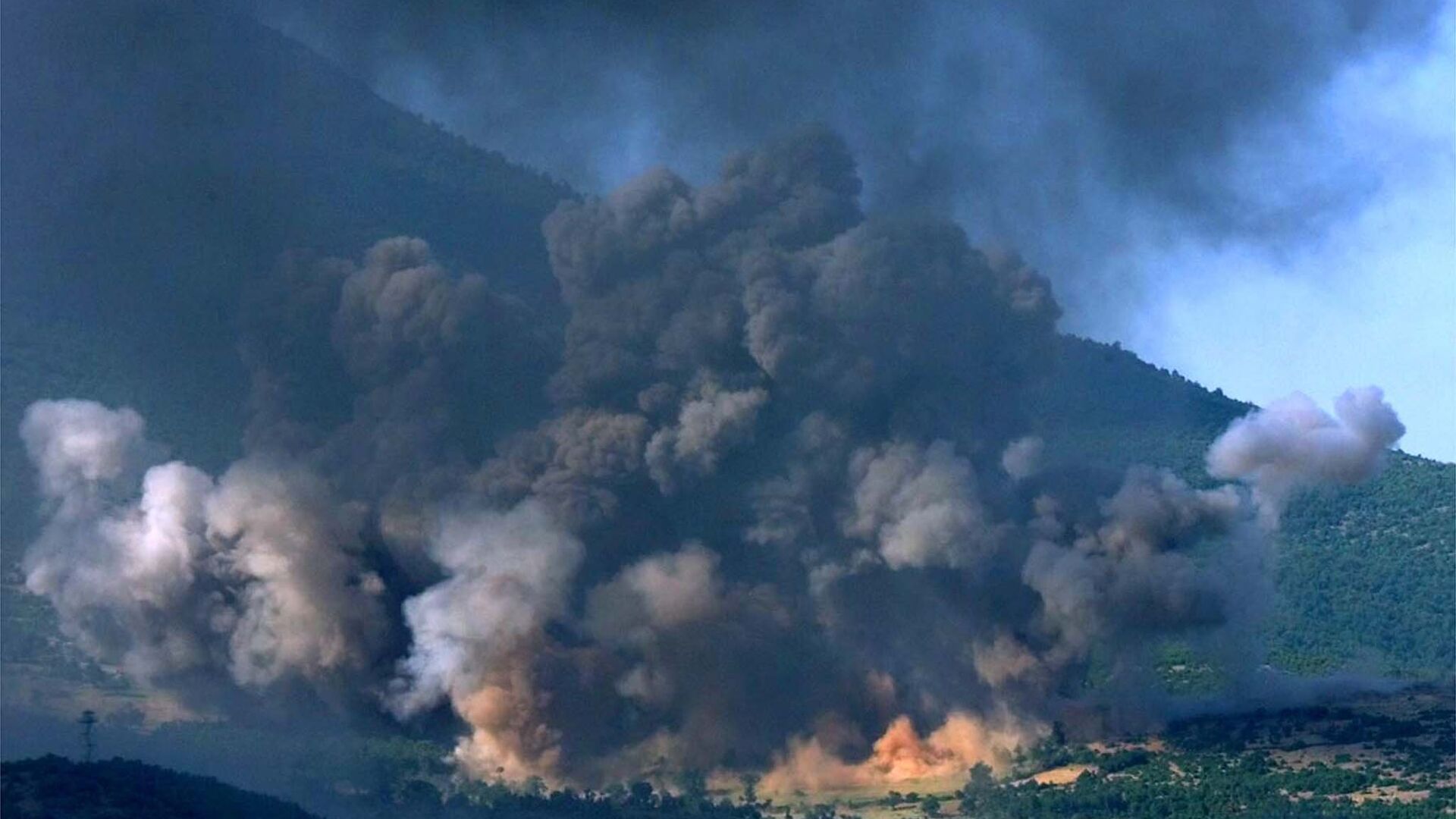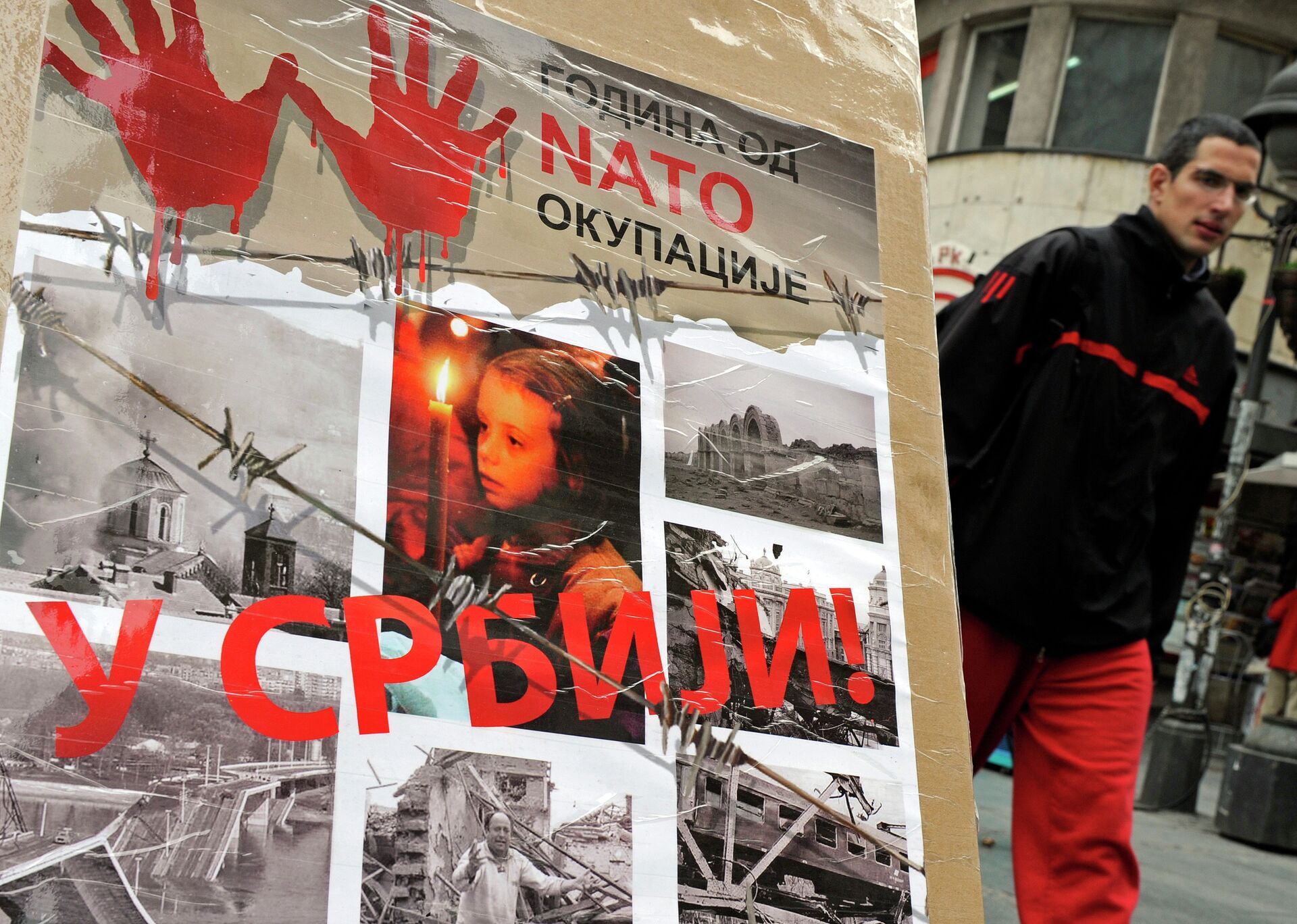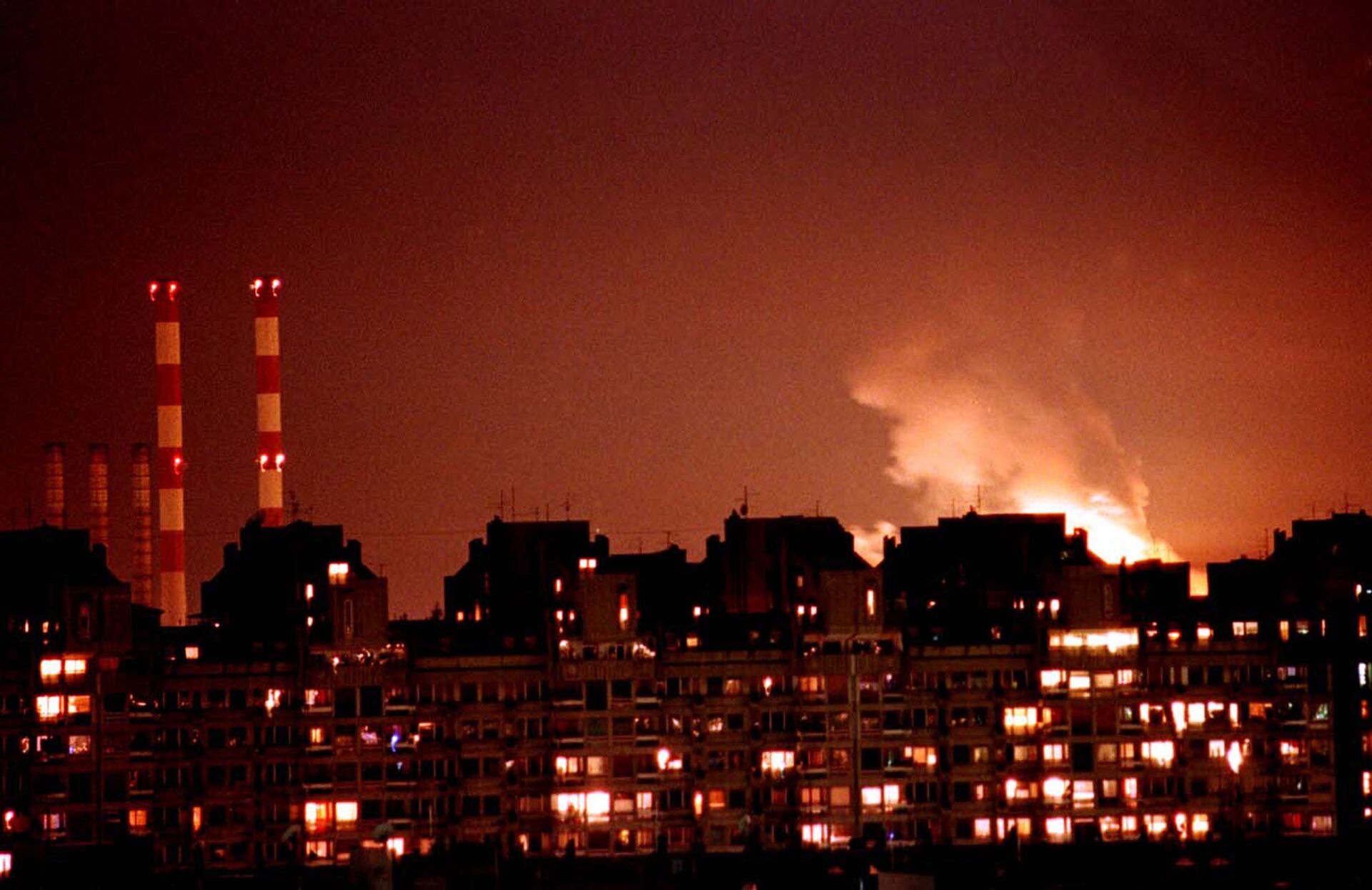https://sputnikglobe.com/20220324/how-us-nato-illegal-bombing-of-yugoslavia-undermined-rule-of-law-in-the-world-23-years-ago-1094157612.html
How US-NATO Illegal Bombing of Yugoslavia Undermined Global Rule of Law 23 Years Ago
How US-NATO Illegal Bombing of Yugoslavia Undermined Global Rule of Law 23 Years Ago
Sputnik International
On 24 March 1999, the US-led NATO bloc launched a bombing campaign, Operation Allied Force, against Yugoslavia which lasted for 78 days. During the operation... 24.03.2022, Sputnik International
2022-03-24T17:35+0000
2022-03-24T17:35+0000
2022-10-19T20:06+0000
world
opinion
us
yugoslavia
russia
ukraine
europe
nato
serbia
kosovo
https://cdn1.img.sputnikglobe.com/img/101991/93/1019919380_0:93:2048:1245_1920x0_80_0_0_1f4da5df1ca7dd8425c68f0cd6e7f2d3.jpg
"Twenty-three years after the NATO aggression in Yugoslavia, the memories among the Serbian population are very vivid," says Dr. Srdjan Sljukic, a professor of sociology at the University of Novi Sad, Serbia. "The anti-NATO feelings dominate not only in Serbia, but also among the Serbs in Republika Srpska (Bosnia and Herzegovina), in Montenegro, etc. In spite of very strong NATO propaganda in the Serbian media that are controlled by the West and the activity of NGOs financed by the West, over 80% of the Serbian population are against the idea that our country should join NATO."The campaign was kicked off after the failure of the Rambouillet talks between members of the Federal Republic of Yugoslavia and the Kosovo Liberation Army (KLA) – a Kosovar Albania militia that was regarded as a terrorist organisation by Belgrade.Two conditions inserted into the agreement were unacceptable to the Serbian side, according to the publicist: first, was a binding referendum on Kosovo independence three years after the signing of the agreement; second, the free movement of NATO personnel under arms through the territory of Serbia itself, to have access to Kosovo.In fact, the US deliberately blocked any peaceful settlement to the conflict in former Yugoslavia to open the door to the military campaign, according to Daniel Kovalik, author and adjunct professor of law at the University of Pittsburgh, in the US state of Pennsylvania.It was former US Secretary of State Henry Kissinger who admitted in an interview with the UK Daily Telegraph on June 28, 1999: "The Rambouillet text, which called on Serbia to admit NATO troops throughout Yugoslavia, was a provocation, an excuse to start bombing.""Bringing the Serbs to Heel"According to RAND's 2001 study, titled European Contribution to Operation Allied Force, NATO's military planners started preparing for a possible operation in Kosovo in May and June 1998. NATO was tasked to develop a wide range of alternative options, from preventive deployments to a full ground invasion to stop the Yugoslavian government from preventing Kosovo's secession.Then-US Senator Joe Biden was an ardent proponent of a NATO invasion of Yugoslavia. “If I were president, I would just bomb Serbian President Slobodan Milošević,” Biden said in October 1998."The bombing was intended to destroy Serbia as an independent country, to occupy 15% of its sovereign territory and eventually recognise the secession of that territory as an independent country in its own right," says Srdja Trifkovic. "So one could say, with equal validity, that if there was a headline in the Völkischer Beobachter in Berlin on 22 of June 1941, that the Wehrmacht was opening the door to peace in the East, that's exactly the same validity. The cover of Time claimed that what NATO had done was opening the door to peace."The Clinton administration's bombing campaign targeted not only the Yugoslavian armed forces. According to some estimates, NATO destroyed or damaged some 25,000 residential buildings, 470 km of roads, 595 km of railway infrastructure, 14 airports, 19 hospitals, 20 health centers, 69 schools, 18 kindergartens, 176 cultural monuments and 38 bridges, causing up to $100 billion in economic losses.NATO aggression provoked a humanitarian disaster and an ethnic cleansing of the Serbs, according to Sljukic: "They were forced to leave their homes and become refugees in their own country," he notes.US-NATO Military Adventurism: From Kosovo to UkraineNATO crimes against Serbs in Yugoslavia have never been thoroughly investigated and those responsible had never been held accountable, according to some observers.US-NATO military moves in Europe did not end with carving out Kosovo, dismantling Yugoslavia and redrawing the European map. Having got away with an illegal bombing campaign, the Western military bloc continued its march to the east, welcoming new members and deploying weapons on Russia's doorstep, according to scholars."NATO expansion to the east has, as many predicted, led precisely to what we see today – the conflict between Russia and Ukraine," claims Kovalik. "The US clearly wanted that conflict, it did everything it could to bring it about and is now trying to prevent peace at all costs."There are parallels between NATO's invasion of Yugoslavia and a similar move by the Kremlin in Ukraine, according to the observers. The member states of the western military bloc turned a blind eye to eight years of Ukrainian shelling in Donbass and widely-reported neo-Nazi battalions, according to Srdja Trifkovic.In a similar vein, the US and its allies gloss over the crimes by the KLA, "in the complete avoidance of any discussion of extremely valid Serbian arguments, both historical and legal," he notes.What is driving the US-led NATO bloc is American exceptionalism that has, since WWII, been "the most dangerous doctrine in the world," stresses Kovalik."[This doctrine] has justified some of the most brutal wars, such as those against Korea, Vietnam, Cambodia, Laos, Iraq, Afghanistan, Libya, Panama and Syria, in the name of ''democracy and freedom' when the goal of these wars was anything but," the academic offered.
https://sputnikglobe.com/20220227/how-western-press-has-kept-silent-for-years-on-war-in-donbass--neo-nazism-in-ukraine-1093401313.html
yugoslavia
ukraine
serbia
kosovo
Sputnik International
feedback@sputniknews.com
+74956456601
MIA „Rossiya Segodnya“
2022
News
en_EN
Sputnik International
feedback@sputniknews.com
+74956456601
MIA „Rossiya Segodnya“
Sputnik International
feedback@sputniknews.com
+74956456601
MIA „Rossiya Segodnya“
opinion, us, yugoslavia, ukraine, europe, nato, serbia, kosovo, kosovo liberation army, bill clinton, joe biden, un security council (unsc)
opinion, us, yugoslavia, ukraine, europe, nato, serbia, kosovo, kosovo liberation army, bill clinton, joe biden, un security council (unsc)
How US-NATO Illegal Bombing of Yugoslavia Undermined Global Rule of Law 23 Years Ago
17:35 GMT 24.03.2022 (Updated: 20:06 GMT 19.10.2022) On 24 March 1999, the US-led NATO bloc launched a bombing campaign, Operation Allied Force, against Yugoslavia which lasted for 78 days. During the operation, NATO aircraft flew 38,400 sorties, including 10,484 strike sorties, and released 23,614 air munitions, killing at least 2,000 civilians and injuring 12,500.
"Twenty-three years after the NATO aggression in Yugoslavia, the memories among the Serbian population are very vivid," says Dr. Srdjan Sljukic, a professor of sociology at the University of Novi Sad, Serbia. "The anti-NATO feelings dominate not only in Serbia, but also among the Serbs in Republika Srpska (Bosnia and Herzegovina), in Montenegro, etc. In spite of very strong NATO propaganda in the Serbian media that are controlled by the West and the activity of NGOs financed by the West, over 80% of the Serbian population are against the idea that our country should join NATO."
The campaign was kicked off after the failure of the Rambouillet talks between members of the Federal Republic of Yugoslavia and the Kosovo Liberation Army (KLA) – a Kosovar Albania militia that was regarded as a terrorist organisation by Belgrade.
"What people in the West have been indoctrinated into believing is that the bombing was the consequence of alleged crimes against Kosovo Albanians," says Dr. Srdja Trifkovic, a Serbian-American publicist, historian, and foreign affairs editor for Chronicles magazine. "Well, that is not true at all. The bombing was a consequence of the Serbs refusing to sign the documents prepared at Rambouillet near Paris, where the conference was held in February of 1999, which was in fact mostly US-inspired."
Two conditions inserted into the agreement were unacceptable to the Serbian side, according to the publicist: first, was a binding referendum on Kosovo independence three years after the signing of the agreement; second, the free movement of NATO personnel under arms through the territory of Serbia itself, to have access to Kosovo.
In fact, the US deliberately blocked any peaceful settlement to the conflict in former Yugoslavia to open the door to the military campaign, according to Daniel Kovalik, author and adjunct professor of law at the University of Pittsburgh, in the US state of Pennsylvania.
It was former US Secretary of State Henry Kissinger who admitted in an interview with the UK Daily Telegraph on June 28, 1999: "The Rambouillet text, which called on Serbia to admit NATO troops throughout Yugoslavia, was a provocation, an excuse to start bombing."
"Bringing the Serbs to Heel"
According to RAND's 2001 study, titled European Contribution to Operation Allied Force, NATO's military planners started preparing for a possible operation in Kosovo in May and June 1998. NATO was tasked to develop a wide range of alternative options, from preventive deployments to a full ground invasion to stop the Yugoslavian government from preventing Kosovo's secession.
"The goal of the NATO bombing campaign was, first, to destroy the last vestiges of socialism in Europe; and, second, to demonstrate to the world that the rest now ran the world and could go to war unilaterally without UN Security Council authorisation," says Kovalik. "The result was the fatal undermining of the rule of law in the world."
Then-US Senator Joe Biden was an ardent proponent of a NATO invasion of Yugoslavia. “If I were president, I would just bomb Serbian President Slobodan Milošević,” Biden said in October 1998.
"The bombing was intended to destroy Serbia as an independent country, to occupy 15% of its sovereign territory and eventually recognise the secession of that territory as an independent country in its own right," says Srdja Trifkovic. "So one could say, with equal validity, that if there was a headline in the Völkischer Beobachter in Berlin on 22 of June 1941, that the Wehrmacht was opening the door to peace in the East, that's exactly the same validity. The cover of Time claimed that what NATO had done was opening the door to peace."
The Clinton administration's bombing campaign targeted not only the Yugoslavian armed forces. According to some estimates, NATO destroyed or damaged some 25,000 residential buildings, 470 km of roads, 595 km of railway infrastructure, 14 airports, 19 hospitals, 20 health centers, 69 schools, 18 kindergartens, 176 cultural monuments and 38 bridges, causing up to $100 billion in economic losses.
NATO aggression provoked a humanitarian disaster and an ethnic cleansing of the Serbs, according to Sljukic: "They were forced to leave their homes and become refugees in their own country," he notes.
US-NATO Military Adventurism: From Kosovo to Ukraine
NATO crimes against Serbs in Yugoslavia have never been thoroughly investigated and those responsible had never been held accountable, according to some observers.
"The ICTY, the International Court Tribunal for Yugoslavia only prosecuted people from Yugoslavia," says Professor Stevan Gajić, a research associate at the Institute of European Studies in Belgrade. "But the conflict of Yugoslavia involved people from the West, it involved NATO countries. But nobody ever held Bill Clinton or Javier Solana or Madeleine Albright accountable. All of them were war criminals; or Tony Blair, for that matter, Robin Cook and many others, Wesley Clark, of course, the chief commander. Nobody held them accountable."
US-NATO military moves in Europe did not end with carving out Kosovo, dismantling Yugoslavia and redrawing the European map. Having got away with an illegal bombing campaign, the Western military bloc continued its march to the east, welcoming new members and deploying weapons on Russia's doorstep, according to scholars.
"NATO expansion to the east has, as many predicted, led precisely to what we see today – the conflict between Russia and Ukraine," claims Kovalik. "The US clearly wanted that conflict,
it did everything it could to bring it about and is now trying to prevent peace at all costs."

27 February 2022, 04:31 GMT
There are parallels between NATO's invasion of Yugoslavia and a similar move by the Kremlin in Ukraine, according to the observers. The member states of the western military bloc turned a blind eye to eight years of Ukrainian shelling in Donbass and widely-reported neo-Nazi battalions, according to Srdja Trifkovic.
"Fourteen thousand civilians in the Donbass who died as a result of Ukrainian shelling simply do not exist," the Serbian-American professional publicist says, adding, "the horrid episode from Odessa on 2 May 2014 does not exist."
In a similar vein, the US and its allies gloss over the crimes by the KLA, "in the complete avoidance of any discussion of extremely valid Serbian arguments, both historical and legal," he notes.
What is driving the US-led NATO bloc is American exceptionalism that has, since WWII, been "the most dangerous doctrine in the world," stresses Kovalik.
"[This doctrine] has justified some of the most brutal wars, such as those against Korea, Vietnam, Cambodia, Laos, Iraq, Afghanistan, Libya, Panama and Syria, in the name of ''democracy and freedom' when the goal of these wars was anything but," the academic offered.





